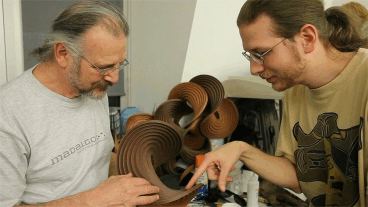| Demaines Become Guggenheim Fellows |
| Written by Alex Armstrong |
| Sunday, 14 April 2013 |
|
MIT Computer Science Professor Erik Demaine and his father, artist and mathematician Martin Demaine have been named 2013 Guggenheim Fellows for their work with origami from wood, plastic, metal and glass. Established in 1925 by former United States Senator and Mrs. Simon Guggenheim, in memory of seventeen-year-old John Simon Guggenheim, the elder of their two sons, who died April 26, 1922, the Guggenheim Foundation makes annual awards to "men and women who have already demonstrated exceptional capacity for productive scholarship or exceptional creative ability in the arts." This year the Demaines were among the 175 artists, writers, scholars and scientists, selected from almost 3,000 applicants.
Martin Demaine is the Angelika and Barton Weller Artist-in-Residence in the MIT Department of Electrical Engineering and Computer Science and a Visiting Scientist at CSAIL. Erik Demaine is a member of the Theory of Computation Group and the Algorithms Group at CSAIL. His research interests range throughout algorithms, from data structures for improving web searches to the geometry of understanding how proteins fold, to the computational difficulty of playing games. An accomplished artist, he is particularly interested in the connections between mathematics and art, particularly sculpture and performance. Several of his curved origami sculptures are housed in the permanent collection at the Museum of Modern Art in New York. A research paper co-authored by members of CSAIL, including the father and son team on Picture-Hanging Puzzles, was presented at last years Fun With Algorithms Conference and approaches aspects of algorithmic complexity from a puzzle perspective. Earlier this year Erik Demaine was selected as the 2013 recipient of the Presburger Award conferred annually by the European Association for Theoretical Computer Science. This award, initiated in 2010, is named after Mojzesz Presburger who accomplished his path-breaking work on the decidability of the theory of addition (which today is called Presburger arithmetic) as a student in 1929, and is made to a young scientist for outstanding contributions in theoretical computer science, documented by a published paper or a series of published papers. The citation for the Presburger Award 2013 reads: Erik Demaine, born in 1981, has made outstanding contributions in several fields of algorithms, namely computational geometry, data structures, graph algorithms and recreational algorithms. In computational geometry and data structures he has solved or made significant progress on classic problems such as the carpenter’s rule problem, the hinged-dissection problem, the prefix-sum problem, and the dynamic optimality conjecture. In graph algorithms he used the powerful theory of graph minors to develop a suite of algorithms for approximately solving a general family of intractable problems. He also started the new field of computational origami, where his book is the leading authority in the field. His work has shown promising applications to computer graphics, sensor networks, molecular biology, programmable matter, and manufacturing and engineering. Gaining these two awards for the twin aspects of his work - the theoretical and the artistic - distinguishes Erik Demaine as an exceptional computer scientist.
More InformationDemaines selected for Guggenheim Fellowship (MIT News) Related ArticlesGames, Puzzles, and Computation (book review)
To be informed about new articles on I Programmer, install the I Programmer Toolbar, subscribe to the RSS feed, follow us on, Twitter, Facebook, Google+ or Linkedin, or sign up for our weekly newsletter.
Comments
or email your comment to: comments@i-programmer.info
|
| Last Updated ( Sunday, 14 April 2013 ) |


